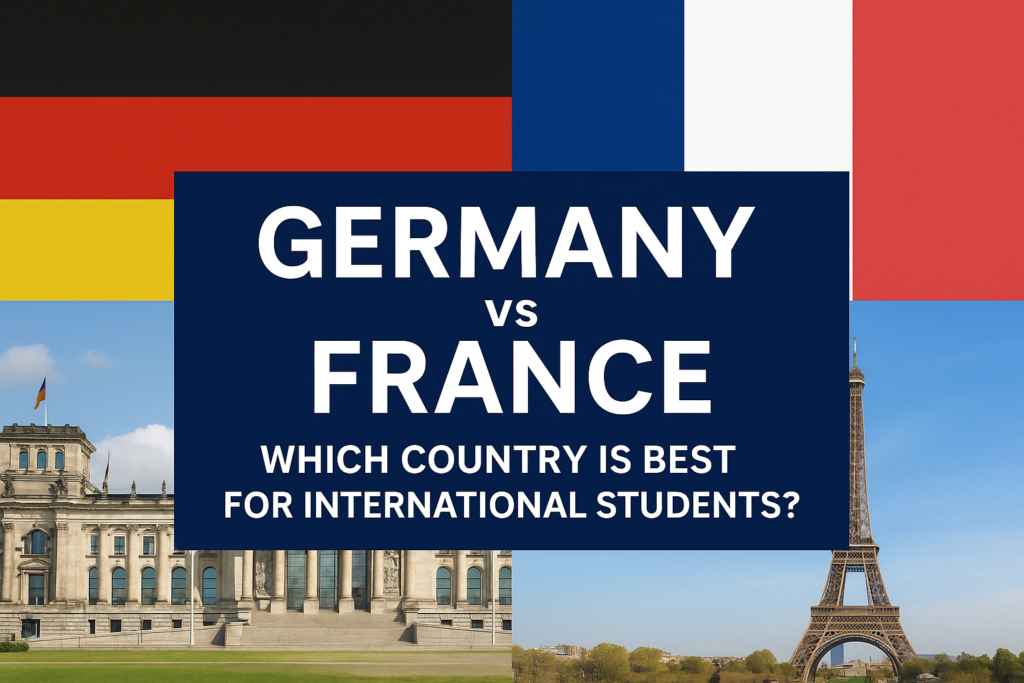Germany vs France – Which is the Best Study Destination in Europe?
Concerning studying in Europe, Germany and France are two of the most popular choices for international students. Both countries offer world-class education, affordable tuition, post-study work opportunities, and a rich cultural experience.
At KCR CONSULTANTS, we guide students in choosing the best path forward. This article compares Germany vs France across key areas that matter the most for students like you—those who wish to study, work, and settle in Europe.
Higher Education System – Germany vs France
Germany is known for its strong academic structure and practical approach to learning. Most public universities offer tuition-free bachelor's and master's programs, even for international students. Only a small semester fee applies.
In France, tuition at public universities is affordable. However, France has a dual system—public universities and Grandes Écoles. The latter are more selective and expensive. Most bachelor's programs in France are taught in French, especially at public universities.
KCR's advice: If your focus is on free education in English-taught programs, Germany is a better choice. If you're fluent in French and aiming for programs in arts, fashion, or hospitality, France is a great destination too.
Language of Instruction – English vs Local Language
France offers English-taught courses, but not as widely as Germany. A French proficiency certificate is often required to join undergraduate programs.
KCR recommends: For students who prefer studying in English without needing local language fluency, Germany has more flexibility.
Tuition Fees and Living Costs
France charges international students around €2,770/year for a bachelor’s and €3,770/year for a master’s in public universities. Living costs are slightly higher in Paris but affordable in other cities, averaging €900 to €1,200/month.
KCR’s insight: For students looking for a cost-effective education, Germany is usually more affordable in the long run.
Scholarships and Financial Support
France offers the Eiffel Excellence Scholarship and other institution-specific grants. However, competition is high.
KCR tip: Germany’s scholarship system is more structured and widely accessible.

Work Opportunities During Studies
In France, students can work up to 964 hours in a year, roughly 20 hours per week.
KCR advice: Both countries allow part-time jobs. However, Germany’s structured work-study model and student-friendly policies make it a better choice for those who plan to gain work experience while studying.
Post-Study Stay Back and PR Options
France allows a 12–24-month temporary residence permit to find a job. PR options are available after 5 years of continuous stay, including studies and work.
KCR guidance: Germany’s straightforward and quick path to PR makes it an excellent long-term choice for students.
Career Prospects in Germany vs France
France is known for aerospace, fashion, art, tourism, and luxury goods. Paris offers opportunities in business, marketing, and design.
KCR observation: If you’re aiming for a career in STEM or engineering, choose Germany. If you are inclined towards the arts, fashion, or business, France can offer good prospects.
Immigration and International Student Support
France also supports international students, but the paperwork and bureaucracy can be more time-consuming.
KCR note: Germany scores higher for ease of living, student support, and smoother immigration processes.
Travel Access in Europe
Germany’s central location allows easy access to countries like Austria, Switzerland, Poland, and the Netherlands.
France offers quick connections to Belgium, Spain, Italy, and Switzerland.
KCR highlight: Both countries are excellent gateways to explore Europe while studying.
Culture, Lifestyle, and Student Life
France offers art, romance, fashion, and food. Students in France enjoy a relaxed lifestyle, outdoor cafés, and cultural events.
KCR point: Germany may suit those who prefer structure and practicality, while France may attract students who love creativity and culture.
Germany vs France – A Quick Summary for Students
Tuition Fees are low, but not free, at public universities.
English-Taught Courses Widely available Less common at UG level
Cost of Living €850–€1,100/month €900–€1,200/month
Work Rights 140 full days/year 20 hours/week (964 hrs/year)
Stay Back After Studies 18 months 12–24 months
PR Pathway 2 years work experience ~5 years residence
Career Opportunities Strong in STEM, Engineering, Strong in Arts, Fashion, Tourism
Lifestyle structured, efficient, Relaxed, artistic
Travel Access Schengen
Final Thoughts: Which Country Should You Choose?
- If you’re looking for tuition-free education, strong job prospects, and a faster PR path, Germany is your go-to option.
- If your interests are in creative fields, and you’re comfortable with French, France is a great alternative.
Still undecided between Germany and France?
Would you also like an SEO-optimised meta title and description for this blog post?






